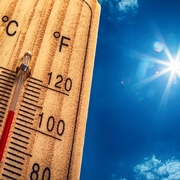Information you need to live a happy, worry-free retirement!
4 Ways You're More Vulnerable to Extreme Heat

With heat waves expected to occur with increasing frequency, it’s important to know how older people are more vulnerable to extreme heat.
The Environmental Protection Agency reports that since 1999, people 65 years old and older have been several times more likely to die from heat-related cardiovascular disease than the general population, while non-Hispanic blacks generally have had higher-than-average rates.
Older adults are more prone to heat stress because:
- They do not adjust as well as younger people to sudden changes in temperature.
- They’re more likely to have a chronic medical condition that changes normal body responses to heat.
- They are more likely to take prescription medicines that affect the body’s ability to control its temperature or sweat.
- People’s ability to notice changes in their body temperature decreases with age.
Failing to recognize that you fall into the “older adult” category can itself be a roadblock to taking extra precautions as you age. Many older Americans don’t heed heat-advisory warnings as carefully as they should because they don’t see themselves as old, ABC news reported.
Heat and Your Organs
Under conditions when sweating isn’t enough to cool the body — extreme humidity combined with extreme heat, for example — body temperatures can rise rapidly. A very high body temperature can damage organs.
Cardiovascular strain, in particular, is a concern. Excess heat can create a higher demand on the left ventricle to pump blood to the skin to dissipate heat. But in the elderly, this increased load can be fatal due to increased strain on an already compromised left ventricle.
High heat also has been linked to kidney injury. A recent report concluded that in a northern climate, periods of higher environmental heat were associated with a modestly higher risk for hospital encounter with acute kidney injury among older adults.
How to Mind the Heat
Know the signs of heat-related illness so you can seek help for yourself or for someone else:
- Heat exhaustion: Cool, pale, moist or flushed skin; heavy sweating; headache; nausea or vomiting; dizziness; and exhaustion. Body temperature will be near normal.
- Heat stroke: Hot, red skin; rapid, weak pulse; changes in consciousness; and rapid, shallow breathing. Body temperature can be very high — as high as 105 degrees F. If the person was sweating from heavy work or exercise, his or her skin may be wet; otherwise, it will feel dry.
How to Treat Heat Illnesses
For heat cramps and heat exhaustion, get to a cooler place and rest in a comfortable position. Someone suffering from heat cramps should lightly stretch the affected muscle and replenish fluids — a half glass of cool water every 15 minutes. Avoid alcohol or caffeine, as this can worsen the condition.
If you or someone else suffers from heat exhaustion, remove or loosen tight clothing and apply cool, wet cloths. Rehydrate with cool water — a half glass every 15 minutes.
If heat stroke is evident, call 9-1-1, as this is a life-threatening condition. Quickly cool the body, immersing the victim in a cool bath or wrapping wet sheets around their body and fanning him or her. Keep the person lying down, cooling the body however possible. Watch for signs of breathing problems, and if the victim is vomiting or refusing water, avoid giving anything to eat or drink.



